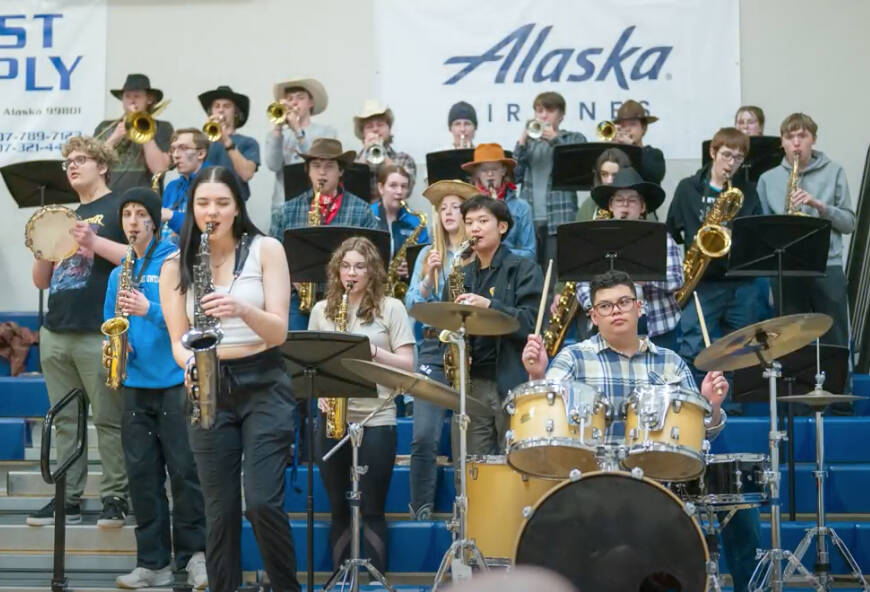Thunder Mountain High School 2024 graduates Jade Hicks and Hayden Loggy-Smith won the “Best Interview” award at the See Stories film festival in Anchorage on May 9 for their documentary “Digging a Hole in the School Budget.”
The documentary explores the Juneau School District’s financial deficit, and its impact on staff and students.
Hicks and Loggy-Smith interviewed students, teachers, high school principals, Juneau Board of Education member David Noon, Superintendent Frank Hauser and state Rep. Andi Story, D-Juneau, for the project. They created the project in an extracurricular semester-long digital media course taught by TMHS teacher Janna Lelchuk.
Hicks and Loggy-Smith said what they learned most from the digital media class was how much planning creating a film requires, such as preparing an outline and collecting release forms from all interviewees.
They began working on the project in December 2023 and completed it in late April in time to be submitted to See Stories, an Alaskan nonprofit that works with youths on social awareness filmmaking and podcasting projects.
Lelchuk encouraged Hicks and Loggy-Smith to enter their documentary once she discovered the competition in March. Other students submitting to the See Stories film festival had a year in advance to prepare their film.
Originally, “Digging a Hole in the School Budget” was 50 minutes long. The film had to be cut down to 15 minutes for the festival’s requirements.
“We had to rush through the post-editing,” Hicks said. “Coincidently, I’ve been taking Digital Arts this past year and so I was able to use Adobe Premiere Pro from that classroom, and a little bit of After Effects.”
The editing featured blackouts for transitioning through interviews, which Hicks said was thanks to Lelchuk’s guidance.
“Whenever someone had a very interesting idea or opinion, that was something Ms. Lelchuk said to make sure to highlight and emphasize, so that’s why we did the fade-to-black transitions,” she said. “We’re both really proud of the way we formatted the interviews of the video. We started from the student opinions because we wanted that to be first, and then we would build up through positions, teachers, to principals, to school board members, the superintendent, and then Rep. Andi Story at the end.”
Hicks said as time went on their target audience shifted.
“Our target audience was the school board, like we wanted to show where our students were coming from when people were advocating for trying to keep both high schools open,” Hicks said. “We just finished our last interview a couple days before the final decision in March. So now we had to work through like, ‘OK, we just shot these interviews to try to convince them to keep both schools open, but now both schools are not going to stay open.’ So then we had to reformat what we were trying to say and our entire plot.”
Loggy-Smith said they asked students from TMHS and Juneau-Douglas High School: Yadaa.at Kalé more opinionated questions so students from both schools could see their individual strengths. Loggy-Smith also wanted the adults who watched their film to know what students thought “made their schools unique.”
Hicks added at first the film was pro-TMHS staying open, but as interviews progressed she realized it shouldn’t just be about their school. She was the TMHS student government president, which she said helped her connect with school board members and Hauser for interviews.
Hicks and Loggy-Smith borrowed a professional DSLR camera to shoot their film in offices or classrooms.
“I think what we’re focusing on, especially when we’re shooting the interviews, is trying to make them as comfortable as possible which is why we shot in classrooms or offices,” Hicks said. “When we handed over the waiver we’d say, ‘we’re going to keep the camera on, but this is more of a conversation than an interrogation.’ I think the hardest part was creating the questions to ask. We wanted to gain information.”
Hicks and Loggy-Smith said they wanted their video to debunk misinformation about the budget crisis and educate viewers.
“I think we were trying to dumb it down for a lot of people because a lot of people just didn’t understand what was happening,” Loggy-Smith said. “There’s been a lot of articles or school board meetings where they explained the deficit, but it was in government terms that a lot of people I don’t think understand. We were trying to simplify it as much as possible.”
Hicks said on a personal level the film helped her work through accepting her high school’s closure.
“We learned a lot of different perspectives, which at times in February and March was very overwhelming,” she said. “After the consolidation was decided it was a good way to work through that.”
As for post-graduation plans, Hicks will attend the New York City School of Visual Arts to study 2D animation, and Loggy-Smith will attend the University of Alaska Southeast for environmental science and biology.
• Contact Jasz Garrett at jasz.garrett@juneauempire.com or (907) 723-9356.

